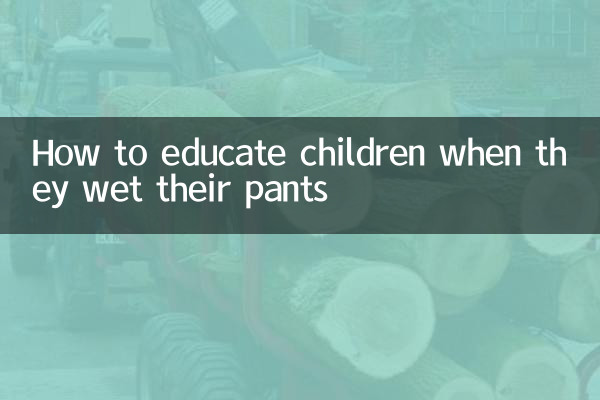How to educate children when they wet their pants
Recently, the issue of educating children about peeing their pants has triggered widespread discussions on major parenting forums and social media. Many parents are confused when their children wet their pants and don't know how to guide them correctly. This article will combine the hot topics and hot content on the Internet in the past 10 days to provide you with structured data and suggestions to help you better deal with this problem.
1. Data analysis of hot topics on the entire network in the past 10 days

| topic | Discussion popularity | Main point |
|---|---|---|
| Psychological reasons why children wet their pants | high | Anxiety, stress, and lack of concentration are the main causes |
| How to guide children correctly | high | Communicate gently, avoid scolding, and establish regular toileting habits |
| The age limit for peeing your pants | in | 3-5 years old is a common stage. People over 6 years old need to pay attention. |
| Common misunderstandings among parents | in | Overreaction, neglect, inappropriate punishment |
2. Common reasons why children wet their pants
According to recent popular discussions, children usually wet their pants for the following reasons:
| Reason type | Specific performance | solution |
|---|---|---|
| physiological reasons | Underdeveloped bladder, urinary tract infection | Seek medical examination and adjust drinking water time |
| psychological reasons | Nervousness, anxiety, distraction | Psychological counseling and reducing stress sources |
| Habitual reasons | Playing and forgetting, resisting toilet training | Regular reminders and establishment of reward mechanisms |
3. Suggestions on parent education methods
Combining expert opinions and parent experience, we have summarized the following educational methods:
| method | Specific operations | Things to note |
|---|---|---|
| Communicate gently | Explain in simple terms the impact of peeing your pants | Avoid using humiliating language |
| Regular training | Set regular toilet time | Take it step by step and don’t rush for success |
| Emotional management | Keep a calm mind and face the unexpected | Do not criticize your child in front of others |
| environmental adjustment | Prepare easy to put on and take off clothes and a small toilet | Create a safe and comfortable toilet environment |
4. Analysis of common misunderstandings among parents
In recent discussions, we have found that parents often make the following mistakes:
| Misunderstanding | adverse effects | Correct approach |
|---|---|---|
| excessive punishment | Increase the psychological burden on children | Use encouragement instead of punishment |
| ignore the problem | May miss disease signals | Record the situation and seek medical treatment promptly |
| compare others | hurt children's self-esteem | Respect individual developmental differences |
5. Suggestions for handling special situations
If your child continues to wet his pants or is accompanied by the following symptoms, it is recommended to seek medical attention promptly:
| Symptoms | Possible reasons | Countermeasures |
|---|---|---|
| Dysuria, frequent urination | urinary tract infection | Pediatric visit |
| Wetting pants evenly during the day and night | developmental problems | Specialist examination |
| accompanied by abnormal behavior | psychological problems | psychological assessment |
6. Sharing of successful cases
Recently, many parents have shared successful experiences on social platforms. Effective methods include:
7. Summary and suggestions
Teaching your children not to wet their pants is a process that requires patience and understanding. Based on recent hot discussions, we recommend:
Remember, every child grows at a different pace and wetting their pants is a common developmental problem. With scientific methods and warm attitude guidance, children will eventually learn to control their bladder and grow up healthily.

check the details

check the details